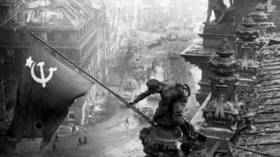Equating Soviet Union to Hitler’s Nazi Germany could land Russians in jail under new plans put forward by country’s ruling party

Equating the leadership of the Soviet Union with Adolf Hitler’s wartime regime could lead to arrests and hefty fines in Russia, under new plans currently being drawn up by the country’s parliament to protect historical memory.
On Wednesday, State Duma deputies published a new draft bill on the lower chamber’s website that would see anyone equivalating the actions of the two historical powers face financial penalties and even jail time.
In the text of the proposed bill, which MPs will vote on, it says, “Amendments have been made to the Code of Administrative Offenses, which propose to establish responsibility for the public equation of the role of the USSR and Nazi Germany.”
Also on rt.com Communist MP wants top Russian TV host prosecuted for calling Hitler ‘a very brave man’ in debate about comparisons with NavalnyThe bill would target anyone who uses “information and telecommunication networks, including the internet, identifying the goals, decisions, and actions of the leadership of the USSR, or the command and military personnel of the USSR, with the goals, decisions, and actions of the leadership of Nazi Germany, or the command and military personnel of Nazi Germany and the European Axis countries… as well as the denial of the decisive role of the Soviet people in the defeat of Nazi Germany and the humanitarian mission of the USSR during the liberation of European countries.”
For violating the proposed legislation, perpetrators could be fined 1,000 to 2,000 rubles ($14 to $28), face administrative arrest of up to 15 days, or be fined 10,000 to 50,000 ($142 to $710) if they are a legal entity. Repeat offenders could be faced with a bill nearly double that amount, or even face suspension from employment for up to 90 days.
In July, Russian President Vladimir Putin signed off on a law banning the drawing of equivalence between the aims and actions of the USSR and those of Nazi Germany during World War II, or the denial of the Soviet Union’s role in defeating fascism.
In February, Communist Party MP Valery Rashkin called on the authorities to take action against TV host Vladimir Solovyov under provisions prohibiting what is described as “the rehabilitation of Nazism,” after he appeared to lavish praise on Hitler while comparing the fascist leader to Russian political figure Alexey Navalny.
“Hitler was personally a very brave man,” Solovyov said. “In contrast to this codpiece Führer [Navalny], he didn’t dodge the army. He fought, and fought valiantly during World War I.”
Last year, MP Elena Yampolskaya suggested to Putin the bill be brought forward, following the publication of books that critics said drew comparisons between the two countries. She said two foreign texts published in Russia equated the USSR with Nazi Germany. One even claimed “the Soviets were worse than the Nazis.”
Also on rt.com Putin announces support for ban on comparing USSR & Hitler’s Germany after book claims ‘Soviets were worse than Nazis’“Unfortunately, we translate and publish such impudent, unsubstantiated, offensive dogs**t in our own country,” Yampolskaya explained. “The first book had 45,000 copies published, and the second 80,000. Both are popular with young people.”
While the Red Army pushed out Nazi troops from much of Eastern Europe, the historical memory of the USSR’s subsequent occupation is a controversial subject in a number of countries, including Poland and the Baltic states. In some cases, monuments to the liberators have been torn down, while local figures who fought with the Nazis have been lionized.
Like this story? Share it with a friend!














